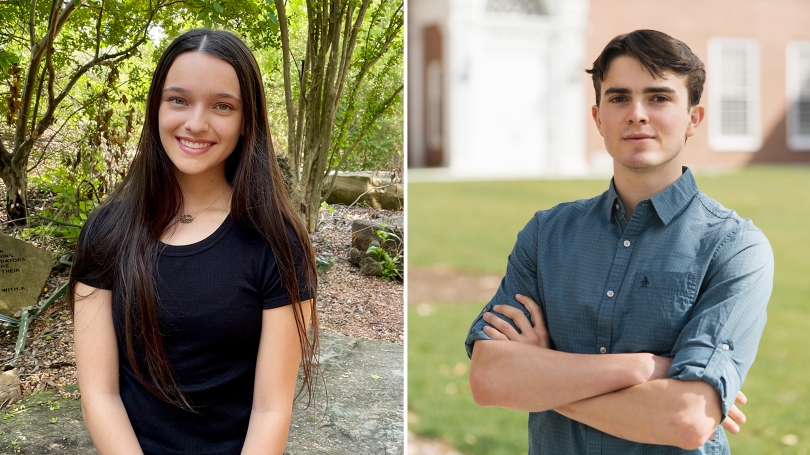Carolina Guerrero '23, a biological chemistry major from McAllen, Texas, and Ian Stiehl '22, an astronomy major with a minor in mathematical physics from Seattle, are among 410 undergraduates from around the country to receive Goldwater Scholarships this year.
For 30 years, the scholarship, named in honor of the late Sen. Barry Goldwater of Arizona, has supported sophomores and juniors in pursuing studies in the sciences, " helping ensure that the U.S. is producing the number of highly qualified professionals the nation needs in these critical fields," according to the program website. The program is among the oldest and most competitive of its kind in the United States.
To learn more about how to apply for Goldwater and other scholarships, visit Dartmouth's Fellowship Advising Office.
Carolina Guerrero '23
"It's a wonderful feeling to finally understand why something happens at a molecular level, rather than just memorizing a process," says Guerrero, who discovered a passion for science as a student in her chemistry class at her high school, Lamar Academy, thanks to "the most amazing chemistry teacher—Ms. Laura Nikstad, who suggested I look into pursuing research as a career."
The summer before Dartmouth, Guerrero participated in Adventures in STEM, offered by the E.E. Just Program. Through the Women in Science Project, she began working in the synthetic organic chemistry lab of Associate Professor of Chemistry Jimmy Wu as a first-year student.
"It was my first time feeling like a researcher," she says. "I had my own projects. I was trained to use Dartmouth's giant million-dollar nuclear magnetic resonance spectrometer—which was a little scary, but really fun. I learned how to think like a scientist."
"I was thrilled to hear that Carolina was selected for a Goldwater Scholarship—but honestly not surprised," Wu says. "Her research project in my lab involved exploring the substrate scope of a new chemical reaction we developed as a key transformation in the synthesis of a specific class of alkaloid natural products. Carolina is a no-nonsense, bright, and determined student with a take-life-by-the-reins attitude. It is a well-deserved award."
Last summer she was accepted into the undergraduate research program at the University of Texas' MD Anderson Cancer Center. The pandemic shifted the program online, and she was able to continue remote research throughout the year. "I'm co-author on a paper that's been submitted to a top journal, and I'm working on the research for what I hope will be my own first-author paper right now," she says.
Guerrero is the managing editor of the Dartmouth Undergraduate Journal of Science and a writer for the National Collegiate Journal of Science.
"I love writing, and being able to communicate complex scientific ideas to a wide range of audiences is critical for bridging the divide between scientists and the general public," she says. "Writing allows me to reflect on my own research and gaps in my understanding, so that I can go back to the lab more prepared to answer those questions."
Guerrero hopes one day to run her own lab, studying the underlying causes of cancer and developing treatments. Receiving the Goldwater Scholarship has "made my dream to become a leading scientific researcher feel a lot more attainable," she says.
Ian Stiehl '22
"Space amazes me—the stars, galaxies, the way the universe develops, the way everything works and why it works," says Stiehl, who aspires to a career at NASA as an astronaut or a flight surgeon.
Stiehl came to Dartmouth planning to major in astronomy while pursuing a premedical track, but he didn't think about combining these two interests until he learned about the two-year Stamps Scholarship program, which provides funds for students to explore interdisciplinary projects. Through Stamps, Stiehl developed a course of independent research in the field of space biology—studying what might happens to living bodies exposed to the conditions of space.
Stiehl's Stamps adviser is Professor of Physics and Astronomy Ryan Hickox, whose course on "Habitable Planets" Stiehl found formative. "Space biology is out of his wheelhouse, since he does research on super-massive black holes, but he helped connect me with different researchers at NASA and provided me with insight on how to navigate the academic world," Stiehl says.
"The thing that stands out most about Ian is that he's so curious," Hickox says. "He's a great student in many different areas, and his work has combined interests in astronomy, medicine, aerospace technology, and governmental policy."
Through Stamps, Stiehl was able to intern at a neurology lab at Harvard Medical School's Beth Israel Deaconess Medical Center, where he studied the effects of different levels of gravity on muscle atrophy.
As a presidential scholar, he is a research assistant for Appleton Professor of Natural Philosophy Marcelo Gleiser.
Outside of his studies, Stiehl is a member of the triathlon club team and the centennial sustainability coordinator for Ledyard Canoe Club, through which he's participated in several trips, including one to the Everglades, and completed his flatwater leader certification. "I'm a huge fan of the outdoors—getting outside has kept me sane during the pandemic."
Among his other Dartmouth activities, he played the role of the cow in the theater department's production of Into the Woods. He has served as a math tutor for the Native American Program, as an undergraduate teaching assistant in the biology department, and as a drill instructor in French.
"Especially early on, I tried to at least take one course that was just out of personal interest and enjoyment while trying to balance my STEM courses at the same time," he says.
Of receiving the Goldwater, he says, "It's a huge honor. It's validating all of the effort I've put into my own independent research, and I'm very excited about that."
Hannah Silverstein can be reached at hannah.silverstein@dartmouth.edu.
